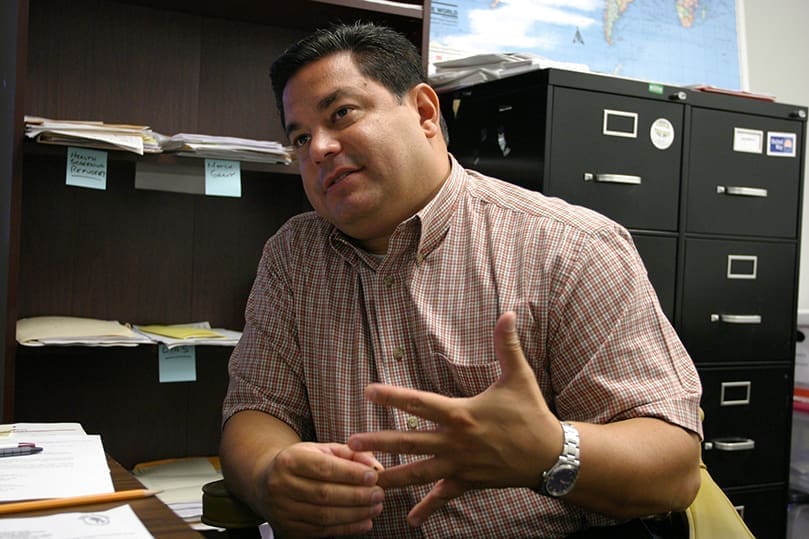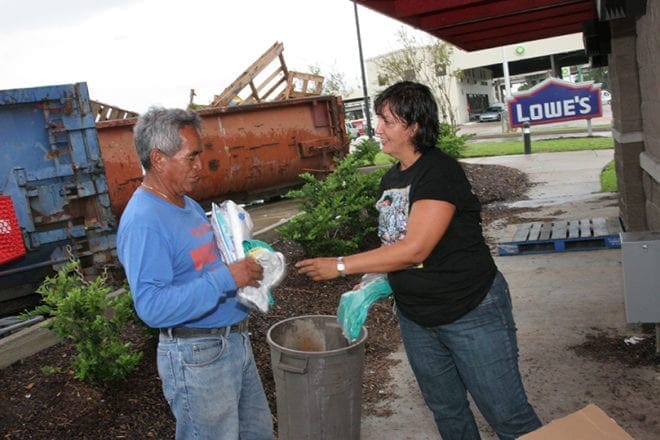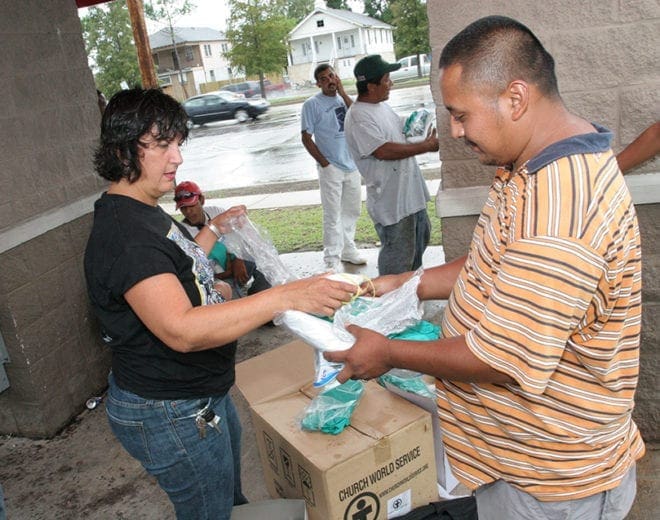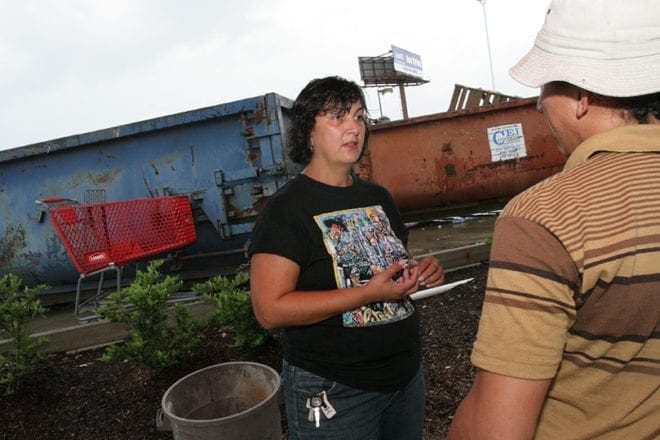 Photo By Michael Alexander
Photo By Michael AlexanderNew Orleans
New Orleans Archdiocese Increases Outreach To Hispanic Laborers
By PRISCILLA GREEAR, Staff Writer | Published August 24, 2006
At 6:15 a.m. Hispanic men gather in clusters and sit curbside chatting and eating tacos con huevos y frijoles being sold from the back of a sedan. Honduran native Wilfredo Quevara steps aside to describe the problems that he and other day laborers face getting paid for their construction work to help rebuild New Orleans.
The 38-year-old with two children in Honduras came to the city seven months ago and says he was fortunate to find an apartment to rent with about 13 others coming and going in a devastated city with a dearth of available units.
He’s found day jobs doing roofing, cleaning, carpentry, plumbing, demolition and gutting—but not yet any permanent job. At some jobs he hasn’t been paid, and once a manager pulled a gun, he said in an interview July 26. The day before at his job, he wasn’t permitted to stop to drink water in 90-degree heat. Others won’t give workers a lunch break.
Clad in a baseball cap, work boots and a T-shirt, he describes his plight to Eva San Martin, an outreach worker of the New Orleans Archdiocese Hispanic Apostolate hired following Hurricane Katrina.
Standing in a gas station parking lot at the corner of Martin Luther King Boulevard and Claiborne Avenue, he says with resignation that some charities conduct surveys, but “they only give out business cards and phone numbers—but no help.”
He wants to learn English but hasn’t had time to take classes. He struggles to negotiate with employers. Competition to get jobs is tough as contractors drive up, he explains. The chosen ones usually load on the truck and negotiate later.
San Martin arises before sunrise to hit the streets and visit the various day laborer pick-up sites around the city to meet these men where they are. She hands out safety gear, such as goggles, gloves and masks, notifies them of educational programs, information fairs and community resources, and provides literature on workers’ rights with advice such as making sure to get an employer’s name, phone, address and license plate number.
Workers with strong cases of abuse are referred to the Southern Poverty Law Center and the Loyola University School of Law legal clinic, which also has filed suit on behalf of 16 plaintiffs asking a federal court to reopen public housing and to block plans to tear down damaged public housing units for thousands of families without hearings or due process protection.
Martin Gutierrez, director of the Hispanic Apostolate for the archdiocese since 1997, has expanded responsibilities since Katrina hit, to help people like Quevara along with Hispanic hurricane victims. He is now also director of immigration and refugee services and Hispanic outreach for Catholic Charities of New Orleans. To him it’s a natural extension of Catholic Charities’ centuries of work for justice and mercy in the region.

Eva San Martin, right, was hired by the Archdiocese of New Orleans Hispanic Apostolate as an outreach worker following Hurricane Katrina. Photo By Michael Alexander
The group’s expanded services to Hispanic Katrina victims and workers have also included trauma counseling to individuals, families and groups by a staff psychologist, job search assistance for documented persons, emergency assistance, legal and other services, and referrals for the uninsured and underinsured to medical care through the Latino Health Access Network.
Before Hurricane Katrina flooded the city, there were roughly 60,000 Hispanics according to the U.S. Census Bureau, plus thousands more undocumented, and a year later an estimated 20,000 to 30,000 newcomers who have come seeking work.
As Gutierrez estimated that about 70 percent of area Hispanic residents have returned in addition to these newcomers, he noted that there has been a lot of “friction” as the Hispanic immigrants from Texas, Georgia, Florida, and across the United States replace the native population and begin this “new phenomenon” of appearing on street corners looking for work. Others are grateful for their immediate rebuilding help.
“After the hurricane the entire city was empty, and then all of a sudden you saw these new Hispanic, Latino workers in town,” Gutierrez recalled. “There is still concern about immigrants coming in and taking jobs that could go to local individuals, but we know there is a huge demand for this type of work force, construction workers, and the local supply is not enough to meet the demand, so you do need this help.”
Gutierrez said that many immigrant workers have lived in tent cities, cars and have been homeless since coming into the city, as have insurance adjusters, contractors and others coming in to provide services.
“Many did not realize the devastation here. They believed housing wouldn’t be a problem. They find themselves in trouble in terms of housing and health care. For regular citizens, health care is a mess; for immigrant workers it’s even worse. Many of the workers are being exploited heavily—a lot of non-payment of wages of those who are fixing homes,” Gutierrez continued. “They’re taking advantage of their immigration status because they think because they are here undocumented they can’t go after them. What we’re trying to do is educate workers about their rights and responsibilities so they won’t get in trouble.”
He noted that for those who haven’t been paid fairly, “sometimes all it takes is making a third call to the contractor saying Joe claims he hasn’t been paid.”
The archdiocesan Hispanic outreach staff has grown from 11 to 32. They normally assist approximately 380 people in a year, but from March through June they have had 312 visits, reported Gutierrez. They’ve been especially busy connecting persons with the Federal Emergency Management Agency and the Small Business Association.
The archdiocese initiated the Workers’ Rights Initiative, in cooperation with other service providers, including the Loyola legal clinic, the Catholic Legal Immigration Network and the Southern Poverty Law Center, to do community outreach regarding wage, labor and immigration issues.

Hispanic outreach worker Eva San Martin, left, hands out safety equipment and toiletry kits to day laborers hanging outside a local home improvement store in New Orleans. Photo By Michael Alexander
Since Katrina the Loyola clinic has started the New Orleans Workplace Justice Project “to bring relief to involved workers who’ve been cheated” and “to try to bring some justice to the workplace environment,” said Luz Molina, Ph.D., clinical law professor. Even for the undocumented “there’s nothing that says they are not entitled to get some relief and get wages paid. At the law clinic we have no restrictions on who we can serve. We’re a Jesuit institution, and social justice is a big issue for us.”
Molina explained that workers’ rights regulations required by the U.S. Department of Labor’s Fair Labor and Wage Division and Occupational Safety and Health Division, which have both been heavily criticized for not proactively investigating reports of abuse, only apply to businesses that are at least a certain size or meet other specifications. There is no federal control over how many subcontractors a company that has been awarded a government contract to rebuild can have. Some may have as many as 12 subcontractors, she explained, which can make for tedious, complex abuse investigations. A typical problem is that one contractor may claim he can’t pay employees until he is paid by another contractor. And in the “rebuilding frenzy” unethical contractors may be driving in from other states and working out of cars.
“Labor laws have to be strengthened in some way, even just municipal ordinances on criminalizing our non-payment of wages,” she said.
Their main focus is defending victims of abusive employers or a convoluted contracting network in Louisiana.
“The workers are not always very savvy. … A lot are picked up on corners and just picked up in trucks, and the problem comes after when they’re not paid,” she said.
She recently called the employer of a man who was only paid $100 for $800 worth of work. He responded that he didn’t care. “He doesn’t have any papers, and we don’t owe him anything.”
The city of New Orleans prior to Katrina was not an easy place to live for the low-incoming workers, Molina said.
Many workers before Katrina lived in the 9th Ward, where there was a “delicate balance,” and when lacking money they could at least fall back on the support of friends. She said the Loyola clinic is partnering with other community groups such as Interfaith Worker Justice, which in February issued a report on reforms needed, including a fairer, more transparent process for awarding government rebuilding contracts and more proactive investigations by the U.S. Department of Labor. It also calls for a workers center to provide temporary housing.
“New Orleans has always had a problem of non-respect for its workers and general level of poverty in the city, which is directly related to the lack of opportunities for workers,” Molina said. “Communities are totally wiped out. Now you just have raw, ugly trailers. Where are the workers now? How are we protecting their income? … We’ve got a big task ahead of us … and I’m not sure where it’s going to lead us, but if we don’t take care of the workers, I don’t know where we’re going to be.”
A study of over 200 workers by Tulane University and the University of California, Berkeley, released in June, supports the contention that undocumented workers are being abused even as they provide critical help to rebuild New Orleans after the most costly natural disaster in American history.
The study found that almost half of the reconstruction workforce in New Orleans is Latino, and 54 percent of that group is undocumented. In the aftermath of the storm, the federal government allowed special waivers of immigration laws, which made it easier for employers to hire undocumented workers. Two-thirds of Latino construction workers have moved to the area since Katrina hit.

Eva San Martin, center, an outreach worker with the Archdiocese of New Orleans’ Hispanic Apostolate, talks with one of the many Hispanic men who came to the New Orleans looking for construction and restoration work after Hurricane Katrina. Photo By Michael Alexander
“We cannot have it both ways: Either we enforce immigration laws effectively and prevent illegal immigrants from working, or we allow them to work and provide them with the same labor, safety and health protections afforded documented workers,” Phuong Pham, assistant professor of the Payson Center for International Development and Technology Transfer at Tulane, said in a press release.
The study found documented workers on average receive significantly higher wages and that construction workers, especially the undocumented, frequently report experiencing problems receiving wages owed. Twenty-nine percent of workers reported working with harmful substances and 27 percent in dangerous conditions, while 19 percent said they were not given any protective equipment for dangerous work. Only 9 percent of undocumented workers have health insurance compared to 55 percent of documented workers, and their awareness of dangerous conditions related to mold, asbestos and unsafe buildings is significantly lower.
The Catholic Legal Immigration Network recently issued “Employment Problems in Louisiana and Mississippi: An Advocacy Manual” with guidance on worker rights for laborers and social workers, answering common questions, outlining basic problem-solving techniques and identifying situations in which legal advice should be sought. In addition, it provides descriptions of government agencies that address workplace issues, organizations that provide free and low-cost legal assistance, low-fee health clinics and resources for job placement, training and education.
Back at the day labor site, this morning is slow for jobs. One contractor drives into the lot, and workers cluster but soon disperse, uninterested in his weak payment offer. San Martin chats with other workers who greet her, one speaking about a shoulder pain he continues to endure from a work injury. Another knows her because she saved his car from being impounded after he was in a car accident and jailed for not having a driver’s license.
After working for many years as a paralegal, she’s grateful for this job where she can use her Spanish and help the suffering. After the storm she contacted the archdiocese to volunteer and later was hired.
Quevara is skeptical that any church would provide him help. But he takes San Martin’s business card and affirms that his Christian faith keeps him strong, quoting Scripture that “perfect love casts out all fear,” and that he is not afraid. He arises at 4 a.m. daily for prayer, where he praises God like a man should honor his spouse, he says, before arriving at a day labor site about two hours later. He believes God placed him here, and he tries to share faith with everyone through his example while repairing homes and businesses.
“Life is rough,” he says, but “when directed by God, he puts everything in your path.”
Quevara, like many workers, is willing to suffer harsh conditions to make a living rebuilding New Orleans.
“I try to fill my thoughts with God in the morning before I get out here,” he says. “We have to be strong and fight to overcome obstacles. We move forward with vision—si, se puede (yes, I can).”